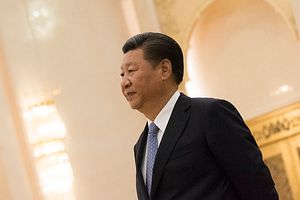The Central Commission for Discipline Inspection (CCDI) is the highest internal-control institution of the Chinese Communist Party (CCP). Most people in China and abroad used to believe that the CCDI’s major function is to counter corruption within the CCP; foreign scholars and media sometimes directly define the CCDI as the CCP’s anti-corruption organ.
But recently, the CCDI declared that the organ’s top priority is to safeguard Chinese President Xi JInping’s status as the core of the CCP Central Committee and the whole Party. Both the CCDI and also the all-powerful National Supervisory Commission (NSC) — the newly established organ designed to oversee all public servants — are defined as the CCP’s political organs. And both organs’ “most fundamental mission” is to “safeguard the leadership of the CCP Central Committee” – not to fight corruption.
On January 11, the CCDI held its third plenary session in Beijing. Xi, who also holds the posts of general secretary of the CCP Central Committee and chairman of the Central Military Commission, addressed the session. In his speech according to Xinhua, Xi repeated demands that all officials — particularly senior officials — must follow the “double safeguards” and the CCDI must take the lead.
The CCP tends to use a lot of political jargon in its various official reports and speeches. The so-called “double safeguards” Xi mentioned means “to resolutely safeguard Xi’s status as the core of the CCP Central Committee and the whole Party, and to resolutely safeguard the authority and leadership of the CCP Central Committee” — a sentence added into the CCP Disciplinary Regulations in 2018.
Thus, what Xi said at the session was actually asking all officials to safeguard his own status.
Xi also stressed that an “iron army” of disciplinary inspection and supervision officials who are “loyal, clean and have strong sense of responsibility” must be built and, at the same time, the “bad apples” must be removed, according to Xinhua.
Xinhua reported that when the session wrapped up, the CCDI also adopted a communique which claims that “the top priority of the CCDI’s work in 2019 remains firmly safeguarding Xi’s status as the core.”
After Xi’s speech, Zhao Leji, the chief of the CCDI, also delivered a 17,000-plus-word work report and his report was passed out at the session. But the full script of Zhao’s report was not released until a month later.
On February 20 — ahead of China’s upcoming annual meetings of the national legislature and the top political advisory body — Zhao’s lengthy work report was finally published on the CCDI’s official website.
When elaborating on how to “firmly safeguard Xi’s status,” Zhao singled out the cases of Sun Zhengcai and Lu Wei. As The Diplomat reported earlier, both Sun (the former top leader of Chongqing city) and Lu (China’s former internet czar) were charged with bribery. Zhao stressed that the CCDI should firmly punish those “disloyal, dishonest, and two-faced” people like Lu.
Meanwhile, the CCDI as well as China’s other propaganda machines published a series of short articles or commentaries, explaining the “essence” of Zhao’s overlong work report.
The essence of all these articles is to emphasize that the “most fundamental mission” of the CCDI as well as the NSC is to safeguard the leadership of the CCP and Xi himself.
Previously, some foreign media outlets have described China’s anti-corruption organ as a tool for Xi to purge his opponents so as to consolidate his own power. The CCDI’s recent declaration seems to indicate that Xi no longer bothers to hide this intention.

































